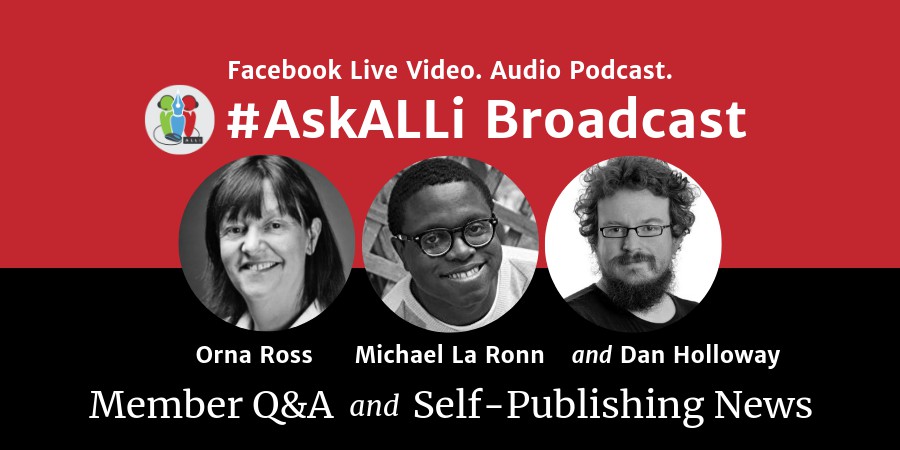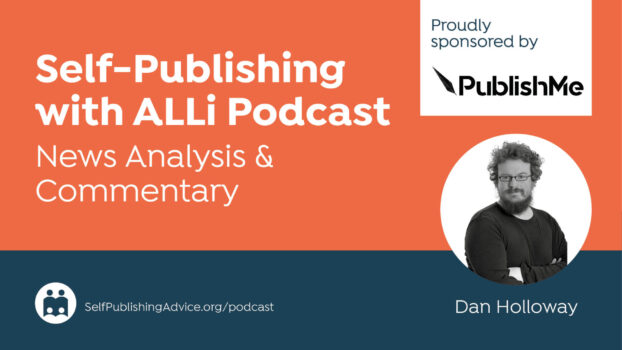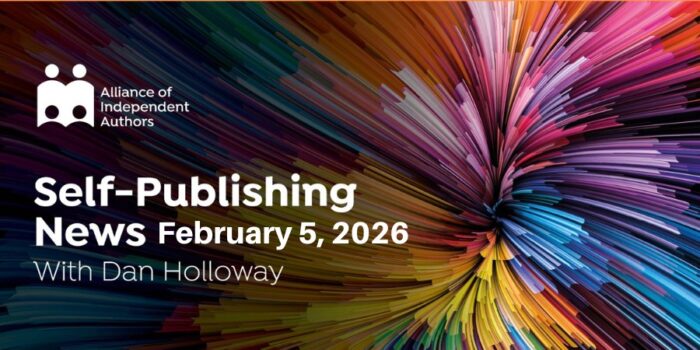What is hybrid publishing and should I consider it? That is among the questions answered this month on our monthly Member Q&A, where ALLi Members’ have their most pressing self-publishing questions analyzed and answered. Join your hosts for the Member Q&A: Partner Liaison and US Ambassador Michael La Ronn and ALLi Director Orna Ross.
Questions this month include:
- I'm struggling with formatting my paperback. What should I do?
- Help! My publishing is withholding my royalties. Can I file a class action lawsuit?
- What is hybrid publishing and should I consider it?
- I've been approached by a foreign literary agency about translating my book. What should I do?
- Should I create a coloring book companion to my children's book?
Also ALLi News Editor Dan Holloway joins Multimedia Manager Howard Lovy in an update on the latest news from the indie author-publishing world. They discuss the latest offering from PublishDrive, an update on the Libraries vs. Publishers feud, and Amazon One-Tap Reviews.
And More!
Here are some highlights:
Orna Ross, on Self-Publishing
If you want to make money writing for a living, you need to kind of take hold of the tools, become self directed, understand the seven processes of publishing, get skilled in these, the ones that you can, and get a bit of a team around you who can help you with the ones that you can't do.
Michael La Ronn on ALLi's Watchdog Database
If you come across any companies that maybe you want to investigate a little bit further, if you come across a company that we haven't investigated, be sure to pass that along to us. And so, you know, our goal is to try to get as many companies as possible into this watchdog database to help authors make these decisions.
Dan Holloway on Indies in Libraries
We can fill the gap, exactly. It's very easy to do. And I would wholeheartedly recommend anyone to put their books into libraries. You can either go direct to Overdrive, or you can do it through platforms, like Draft2Digital, it's very simple to get your book into libraries.
If you haven’t already, we invite you to join our organization and become a self-publishing ally. You can do that at http://allianceindependentauthors.org.
Now, go write and publish!
Listen to the #AskALLi Members Q&A
Don't Miss an #AskALLi Broadcast
Subscribe to our Ask ALLi podcast on iTunes, Stitcher, Player.FM, Overcast, Pocket Casts, or Spotify.
OR, sign up to get notified via email right when a broadcast is about to go live on Facebook and when a new podcast is published (#AskALLi advice on Wednesdays and indie inspiration on Sundays).
Watch the #AskALLi Members Q&A
What is hybrid publishing and should I consider it? That is among the questions answered this month on our monthly Member Q&A with @OrnaRoss and @MichaelLaRonn Share on XAbout the Hosts
Michael La Ronn is the author of over 30 books of science fiction & fantasy and authors self-help books. His books include the Galaxy Mavericks series and Modern Necromancy series. You can now find his new writing course on Teachable.
Orna Ross launched the Alliance of Independent Authors at the London Book Fair in 2012. Her work for ALLi has seen her named as one of The Bookseller’s “100 top people in publishing”. She also publishes poetry, fiction and nonfiction, and is greatly excited by the democratising, empowering potential of author-publishing. For more information about Orna, visit her website: http://www.ornaross.com
Dan Holloway is a novelist, poet and spoken word artist. He is the MC of the performance arts show The New Libertines Earlier this year he competed at the National Poetry Slam final at the Royal Albert Hall. His latest collection, The Transparency of Sutures, is available on Kindle.
Read the Transcript
Howard Lovy: And now for the news from the self publishing world with ALLi news editor Dan Holloway, who is also a three time champion of the European Speed Reading Competition. Say hello, Dan and also tell us about your new title.
Dan Holloway: Good to be here, yes, so the European Speed Reading Competition is held as part of the Mind Sports Olympiad at the end of every August. I've been there for three years now and managed to win it three times. It's a fabulous contest because you basically are getting free books. So the task is to read an unpublished novel. It's brought in by the publisher. So we get free advance copies of really fun books. So why wouldn't you take part in something like that?
It's quite controversial in amongst writers I know because they have a feeling that if you speed read something, you're not taking it seriously. There's documentary being shown and I'm hoping that that will help to break some of the stereotypes and stigmas around what it means to take a book seriously and what it means to actually read a book because I know it's something we've talked about, for example, with the increase in audiobooks-
Howard Lovy: You are actually enjoying these books as you read them really fast?
Dan Holloway: Very much enjoying them.
Howard Lovy: And you must be because they also test you on comprehension. It's not just done. Yes.
Dan Holloway: They do. Yes, you get you get a detailed comprehension test.
Howard Lovy: Well, that's that's just amazing, not just once but three times, a three time European Speed Reading Champion, and I'm very happy to know you. And please don't forget all us little people as you as you move on to greater glory.
Dan Holloway: Or maybe even book sales after this. So talking of different kinds of reading and audiobooks. I gather you're still audiobook creating.
Howard Lovy: Yeah, well, I'm producing audio books for individual clients, I just finished one for a business book. My Inspirational Indie Authors podcast have been pretty well received. And I try to make those into more of a mini documentaries about these authors. And other than that, I'm continuing a gig for Publishers Weekly where I interview Jewish authors, I just had an article featuring Bari Weiss, who's a New York Times opinion writer who wrote a book called How to Fight Anti-Semitism. And with all my focus on writing for Jewish publications and featuring Jewish authors and making my Twitter feed primarily about Jewish issues is in preparation for me to sell someday, hopefully soon, Jewish themed books.
So let's move on to the news. Let's talk about PublishDrive and they have a new subscription model that you recently wrote about.
Dan Holloway: Yes. I love PublishDrive. They're always a really interesting company. But they always do really interesting things. One of the things they tend to do is they tend to be the first company to do things. I think in my column I called it a very bold decision, it can be quite risky because if you don't have a huge amount of money behind you, then being the first to do something, you are reliant on your customers catching up with the idea quite quickly. And it's going to be really interesting to see what happens with this.
So the model is basically as a writer, instead of your distribution platform taking a cut from as the sale, which is how it tends to work at the moment, what happens is you pay a fixed monthly subscription, there are four levels, it goes from from free, if you only have one book, but the priced option starts at $20 a month for up to five books, going all the way up to an unlimited option, which is rather ominously priced at “Ask for a quote.” So that you get a variety of services, including everything you would expect from PublishDrive, like their customized Amazon ads. And in the top case, you get a dedicated representative to work with you on strategy, and you obviously get full distribution to all the outlets they distribute to. And you get to keep 100% of the income from the places you distribute to so not the sale price, but the amount of money that comes from each of those platforms. So-
Howard Lovy: I see, okay.
Dan Holloway: It's something that I think I've seen a little bit of skepticism about from writers because we're very used to the idea that someone takes a cut on every sale we do, and that's how it's done in the literary world. But more and more for readers and in other tech industries, other digital industries, it's more common to get this simplified distribution model or subscription model. I think it feels like a really sensible thing to do. But I can see why authors are really nervous about it and skeptical about it. So it almost feels like a race-
Howard Lovy: At the same time, Indie authors are more likely to want to experiment with something new like that, right?
Dan Holloway: Well, that's that's sort of true in theory, yes. In practice, we can be quite conservative with that kind of thing. But I can see, I can certainly see people with a lot of sales, a lot of books, thinking it's a really good idea.
Howard Lovy: Right? Right. I guess the the higher the sales, the more attractive this is, at least, if you can at least make up that hundred dollars per month.
Dan Holloway: Yes it's $100 per month for up to fifty titles, that's a sort of the second from top level, that's going to be most, I think, of the ALLi members who've got more than five but fewer than 50 books. But it's interesting. It feels like a bit of a race. What's going to happen to us? Are we all going to be won over or are they going to run out of cash. So I hope they succeed at it.
Howard Lovy: I guess we're still in the war of libraries versus the publishers versus the authors. And maybe you can help us make sense of all this.
Dan Holloway: Yeah, well, the libraries made it, they issued or they launched a petition at Digital Book World last week. basically asking publishers to stop their restrictive practices. Because they feel that it's basically it's withholding access to literature from as broad an audience as possible. Publishers have responded not favorably, they're basically saying library sales are cannibalizing their regular sales. So and there's a lot of controversy over where they're getting those figures from. There's a lack of transparency. I think this is one of the issues as well. What is it the publishers are doing to to be able to claim this?
So there are also some allegations going around about Overdrive, because Overdrive has a link with Amazon. So you can borrow Kindle books, through your library in your libraries in the Overdrive program. And so there has been speculation about our publishers getting these figures from Overdrive. And is this Overdrive overreach? And should they be doing this?
There's also a very interesting comment from The Passive Voice blog, which is run by a copyright lawyer. And this is one of the literary world's most looked to blogs, and he has a very, like, he basically says, any other business, if you're worried that someone is going to cannibalize your sales by doing something that is better for you to go do it yourself. He doesn't get why publishers aren't just going to libraries and saying “Let's work with you and create something that works for both of us.” But instead, we've got this this standoff between the two sides.
Howard Lovy: Yeah, it makes no sense to me, anyway, because obviously, for hundreds and hundreds of years, publishers had no problem with libraries lending their books, I think the technology scares people. We mentioned this last month, I think all of this is probably still good for Indies, if the big publishers aren't in libraries, Indies can fill the gap.
Dan Holloway: We can fill the gap, exactly. It's very easy to do. And I would wholeheartedly recommend anyone to put their books into libraries. You can either go direct to Overdrive, or you can do it through platforms, like Draft2Digital, it's very simple to get your book into libraries.
Howard Lovy: And there's nothing to fear from libraries. So if they read one of your books for free, maybe they'll want to buy all your other books, or maybe buy their own copy of the book they read at the library. It's an ancient story. You know, libraries, encourage a love of books that lasts a lifetime. So I don't know what all the fuss is about.
Dan Holloway: I think I said last time, anyone, if you start arguing against libraries, you're sort of on the wrong side of history. And I think that's pretty much where I stand on that.
Howard Lovy: Yeah, no, we are not anti library over here. There's a new thing called Amazon one tap review that you wanted to talk about.
Dan Holloway: So, yes, see, the new one tap feature on Amazon is basically is designed to make it easier to get feedback on product, it's in beta at the moment, it's been set up to work across the whole Amazon range. So the books, but also the physical products and anything you buy on Amazon, you can just tap the single button with the number of knowledge you want to give it and it gives a rating. So you don't have to write a review. And you don't have to go through a complicated process to go somewhere to write a review. You can just give a star rating. So a bit like Goodreads.
Howard Lovy: Yeah. But you can give a full written review if you want to, or is this is just-
Dan Holloway: You can give a written review as well. Yes. Yes, it doesn't replace a written review. It's just an easy alternative. I mentioned this to my members. And the response has been pretty positive. I think because most of us, if we struggle with one thing, other than sales, it's getting ratings and getting reviews. So anything that makes it easier for people to leave you a rating, jas got to be a positive.
Howard Lovy: Right, right. Yeah, you know this. I'm a former book review magazine editor. So I'm a big fan of full reviews and not just star ratings, but at least this is something and also doesn't indicate that, that they've actually read the entire book. And so they're more likely to give it a five star rating if they finished the book.
Dan Holloway: Yeah, you're unlikely to finish a book if you really hate it. And yes, I think the moment you finish the book the faded out version of the stars pop up, and you can click the star rating then and there. So it's a really good way of catching you while you're still feeling enthusiastic about that amazing ending you just read.
Howard Lovy: That's right. Right. Great. Okay, Dan, well, thank you very much for giving us a news update. And I'll talk to you again next month.
Dan Holloway: Thank you very much indeed. Always a pleasure.
Howard Lovy: Thank you, Dan. Bye.






I was rather surprised to hear you say that distribution is one of the easiest processes for self-publishers, or maybe I heard that wrong. My client authors do want to be stocked in B&N and indie bookstores, particularly the children’s picture book authors. Do you think that it’s more important for picture books to be in brick and mortar stores than other genres? Orna didn’t seem to think it was worth the trouble for most self-published books. This is something I need to examine more thoroughly for my clients. Do you have something on your website that looks at the pros and cons of being in physical stores vs online?
Hi Mimi, great question. If you think about access to readers, clearly the online stores vastly outweigh the access that any physical store, even the largest chains like B&N, can have. And the economics of physical bookstore distribution, given the discounts bookstores need to make their profit, are punishing, even for big publishers. For micro-publishers, they are a vanity. Books are sold in bookstores every day, of course, but far far more books (including childrens and other illustrated books) are sold online, and for far great profit to the author (especially when sold on the author’s website).
The take-up for picture books was slower than for standard adult fiction, but now catching up.
Authors want to be in bookstores, sure, but if you weigh the effort and likelihood of success, online wins every time.
And more and more, as time goes on.
Of course, that’s where marketing then comes in. Distribution is only the first step, making sure we are available in as many online stores as possible. Current ALLi recommendation is to be in Amazon, Apple, Kobo, Google Play and IngramSpark… and to use an aggregator like PublishDrive to reach the rest (and those larger stores too perhaps, if time is tight).
I hope that is helpful. Do let me know if you have further questions.
I’m just listening to the question regarding paperback formatting. I can highly recommend the Reedsy formatting program, it is free easy to use and makes, ebook, paperback and PDF
Susan
Thanks Susan! Reedsy is a great partner for indie authors